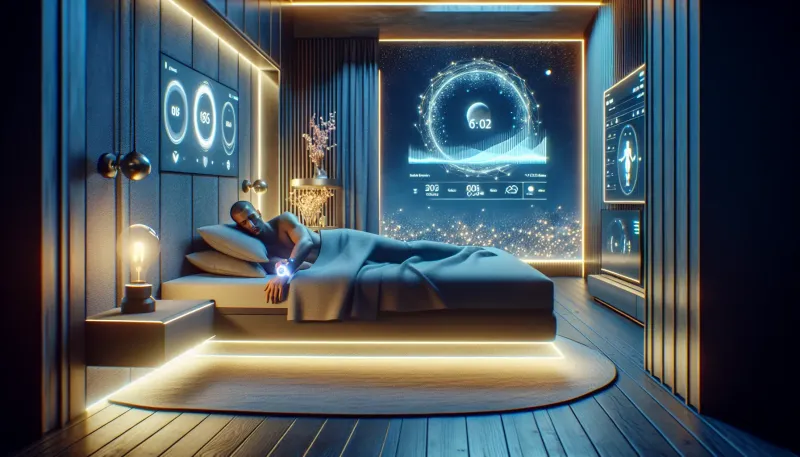The Future of Sleep: How Technology is Enhancing Sleep Quality

Explore how innovative technology is transforming sleep quality. Learn about smart mattresses, sleep tracking apps, and more in our in-depth article.
Introduction
Sleep is a fundamental aspect of human health and well-being. Despite its importance, many people struggle to achieve good sleep quality. Advances in technology, however, are paving the way towards solutions that promise to enhance our sleep patterns and overall sleep quality. This article explores the various ways in which technology is revolutionizing sleep, providing insights and solutions for those seeking to improve their night’s rest.
The Importance of Sleep Quality
Before delving into the technological advances, it's crucial to understand why sleep quality is vital. Poor sleep can lead to a host of health problems including obesity, heart disease, and diabetes. Moreover, it affects cognitive functions, emotional regulation, and overall productivity.
Effects of Poor Sleep Quality
Chronic sleep deprivation can result in significant cognitive impairment, including problems with memory, decision-making, and concentration. Emotional instability and mood disorders like depression and anxiety are also closely linked with inadequate sleep. Understanding these repercussions underscores the importance of striving for better sleep quality.
Technological Innovations Enhancing Sleep Quality
Smart Mattresses
Smart mattresses are becoming increasingly popular. Equipped with sensors that monitor body movements, heart rate, and breathing patterns, they offer real-time feedback and adjustments to ensure a comfortable sleep environment. Brands like Sleep Number and Eight Sleep are leading the way in delivering personalized sleep experiences.
Wearable Sleep Trackers
Wearable devices such as Fitbit and the Oura Ring have transformed the way we monitor sleep. These devices track sleep cycles, providing detailed insights into the duration and quality of each sleep stage. This data can be crucial for identifying sleep disorders and making necessary lifestyle adjustments.
Sleep Tracking Apps
Apps like Sleep Cycle and Pillow harness the power of smartphone technology to analyze sleep patterns. By using the device's microphone and accelerometer, these apps can detect and record your movements and sounds throughout the night, giving you a comprehensive overview of your sleep quality.
Light Therapy Devices
Light exposure plays a significant role in regulating the body's internal clock. Light therapy devices, such as the Philips Wake-Up Light, simulate natural sunlight to help regulate sleep cycles. These can be particularly beneficial for addressing issues like Seasonal Affective Disorder (SAD) and circadian rhythm disruptions.
White Noise Machines and Sound Apps
Incorporating sound technology into sleep environments can have a profound impact on sleep quality. White noise machines like the Snooz and apps such as Noisli provide soothing background sounds that mask disruptive noises, helping to facilitate deeper sleep.
Temperature Regulation Gadgets
Maintaining an optimal sleep temperature is essential for good sleep quality. Gadgets like the BedJet and Chilipad use climate control technology to create the perfect sleep environment, adjusting the bed's temperature to your preference.
The Science Behind Technology-Driven Sleep Enhancements
Role of Data in Sleep Improvement
One of the key benefits of using technology to enhance sleep is the data it provides. Detailed sleep data helps individuals understand their sleep patterns, identify problems, and track improvements over time. This can be especially beneficial for those suffering from sleep disorders like insomnia or sleep apnea."
Personalization and Adaptation
Technological devices are increasingly leveraging artificial intelligence to adapt to individual needs. For instance, machine learning algorithms can analyze sleep data to personalize recommendations and adjust environmental factors to improve sleep without manual intervention.
Integration with Health Ecosystems
Many sleep technologies integrate seamlessly with other health and wellness platforms. This creates a comprehensive picture of an individual’s health, offering deeper insights and facilitating a more holistic approach to improving sleep quality and overall well-being.
Addressing Common Sleep Issues with Technology
Insomnia
For those struggling with insomnia, technology offers various solutions. Cognitive Behavioral Therapy apps like CBT-i Coach are designed specifically to help users understand and overcome insomnia through structured therapy sessions.
Sleep Apnea
Continuous Positive Airway Pressure (CPAP) machines equipped with smart technology provide significant relief to sleep apnea sufferers. Modern CPAP devices from brands like ResMed offer real-time data tracking and remote monitoring, ensuring that users receive the most effective treatment.
Restless Leg Syndrome (RLS)
Technologies like vibration platforms and compression devices can provide relief for those with RLS. These devices help by promoting circulation and reducing the discomfort associated with restless leg syndrome.
Future Directions in Sleep Technology
As technology continues to evolve, the future of sleep holds promising advancements. From AI-driven personalized therapy to incorporating virtual reality for stress relief, the horizon is rich with potential.
AI and Machine Learning
Artificial intelligence is set to revolutionize sleep technology by delivering hyper-personalized sleep solutions. Machine learning algorithms will become more sophisticated, offering tailored recommendations and adapting in real-time to changes in sleep patterns.
Virtual Reality and Sleep
Virtual reality (VR) is emerging as a tool for relaxation and managing sleep disorders. VR environments can provide immersive experiences designed to reduce stress and anxiety, promoting better sleep hygiene and quality.
Integration with Smart Homes
The future will see further integration of sleep technologies with smart home ecosystems. Through interconnected devices, users will be able to control every aspect of their sleep environment, from lighting to temperature, all through centralized platforms like Amazon Alexa or Google Home.
Conclusion
Technological advancements are playing a transformative role in enhancing sleep quality. From smart mattresses to sleep tracking apps, these innovations offer novel solutions to common sleep issues. As these technologies continue to develop, they hold the potential to revolutionize our approach to sleep, leading to healthier and more rested lives. Leveraging technology can provide a valuable strategy for anyone seeking to improve their sleep quality, ultimately contributing to better overall health and well-being.



























